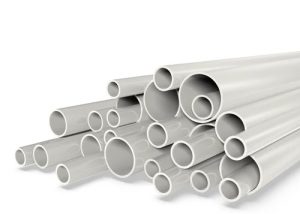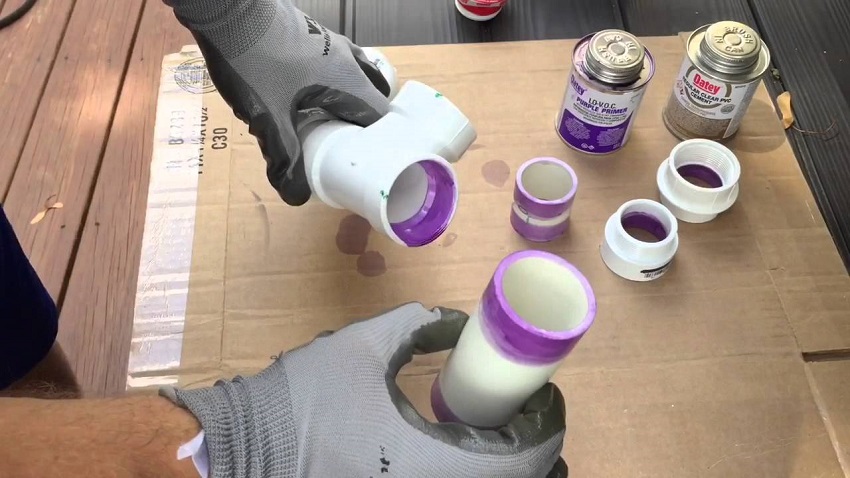PVC pipe, or polyvinyl chloride pipe, is a versatile and long-lasting piping material used in various applications for decades. This pipe has become popular for many projects, ranging from plumbing to electrical conduit and so on.
So, what is PVC pipe used for? Apart from plumbing systems and electrical conduits, PVC pipe is widely used in construction for everything from window and door frames to building facades and roofing materials. PVC pipe is also a popular material in the manufacturing industry.
It is used to make everything from toys and furniture to medical equipment. This article will look at PVC pipes’ applications, benefits, and drawbacks to help you understand how they can be used.
What Is PVC Pipe?
PVC is made from the monomer vinyl chloride (CH2=CHCl), produced by reacting ethylene with chlorine gas. The resulting vinyl chloride monomer (VCM) is then polymerized into PVC resin by suspending it in water and adding initiators and stabilizers.
Types of PVC Pipes
Different versions of PVC are available in the market, each with unique properties and applications. Here are some of the commonly used types of PVC:
● uPVC (Unplasticized PVC)
uPVC is a rigid and strong form of PVC with no plasticizers. It is also called rigid PVC or PVC-U. They are utilized in sewers and drainage systems to convey safe drinking water.
● cPVC (Chlorinated PVC)
cPVC is a modified form of PVC that has been chlorinated to increase its heat resistance and flame retardancy.
● Modified PVC
These include PVC-O, PVC-M, and PVC-HI. Modified PVC has a high impact resistance, tensile strength, and fatigue resistance compared to other forms of PVC.
● PVC-A (Acoustic PVC)
PVC-A is a special form of PVC formulated to absorb sound and reduce noise transmission. It is used in applications where sound insulation is essential, such as building insulation, flooring, and acoustic barriers.
What is PVC Pipe Used For?
Here are some of the most common applications of PVC pipes:
● Water Supply and Drainage Systems
Because of their resistance to corrosion and chemical damage, PVC pipes are widely used in water supply and drainage systems. Its smooth inner surface allows for high flow rates and low-pressure loss, making it an efficient choice for water distribution systems.
PVC pipes are also suitable for this application due to their inert properties, which prevent contamination of potable water. The usage of PVC in drainage systems is due to PVC’s synthetic qualities of corrosion and rust resistance and its resistance to microbial film growth.
● Telecommunication Application
PVC is widely used in the telecommunication industry to insulate and protect electrical wiring. PVC pipes and conduits are commonly used to house and protect fiber optic cables, telephone wires, and other communication cables.
The smooth surface of PVC pipes and conduit reduces friction, making it easier to pull wires through them. PVC is also resistant to moisture, chemicals, and UV rays, making it a reliable choice for outdoor applications.
● Fire Sprinkler System
PVC pipes are also used in fire sprinkler systems as they are a cost-effective and reliable option for transporting water. They are resistant to corrosion and rust, making them suitable for wet environments.
Moreover, these pipes can be easily cut to size and joined using adhesive or solvent welding, making them easy to install. PVC pipes also have a high heat tolerance, making them suitable for fire sprinkler systems.
● Irrigation Systems
PVC pipes are widely used in irrigation systems, where they are used to transport water to crops, gardens, and lawns. They are easy to install, affordable, and ideal for critical water conservation areas.
● Chemical Handling
PVC pipes are often used for transporting chemicals from one location to another. They can be used to transport various chemicals such as acids, alkalis, and salts, as well as some organic solvents. PVC pipes are resistant to many chemicals and can handle multiple pH levels.
● Electrical Conduit
PVC pipes are also commonly used as electrical conduits because they are non-conductive and provide excellent insulation. These pipes are also flame-resistant and can withstand exposure to harsh environments.
● HVAC Systems
PVC pipes are lightweight, easy to install, and corrosion-resistant. C-PVCs are the most common PVCs used in HVAC systems. CPVC is highly resistant to corrosion and can withstand the corrosive effects of acids, alkalis, and other chemicals commonly found in HVAC systems.
This makes it an ideal material for use in pipes and fittings. It can also withstand high temperatures, up to 200°F (93°C), making it suitable for use in HVAC systems where hot water or steam is used. This high-temperature resistance also allows CPVC to handle higher flow rates than other materials.
CPVC pipes can be insulated with foam to increase their thermal insulation properties.
● Cable Protection
PVC pipes are commonly used to protect cables from damage and exposure to the elements. Because of excellent insulation, these pipes help protect the cables from moisture and corrosion.
● Gas Distribution
PVC pipes are used in gas distribution systems because they resist corrosion and protect against leaks. These pipes are also lightweight and easy to install, making them a cost-effective gas distribution option.
● Industrial Applications
Accordingly, PVC pipes are used in various industrial applications also. That includes chemical processing, oil and gas transportation, and mining operations. PVC pipes are resistant to harsh chemicals and corrosion, which makes them suitable for these applications.
● Greenhouse
PVC pipes are commonly used in greenhouse construction to provide structural support. These pipes are lightweight, easy to handle, and easily bent into various shapes. Hence, it makes them ideal for constructing greenhouse frames.
● Healthcare Items
Apart from all the above uses, PVC medical tubing is commonly used in the healthcare industry for various applications, such as intravenous (IV), blood transfusion, and catheter tubing. It is preferred due to its excellent chemical and physical properties.
PVC pipes in Everyday Use
Here are some uses of PVC pipes in our household activities.
● Storage Solutions
PVC pipes can be cut to various lengths and used to create custom storage solutions. For example, PVC pipes can be cut into small sections and attached to a wall to create a holder for tools, brooms, or mops.
● Gardening
PVC pipes can be used to create various garden tools and accessories. For example, they can be cut and joined to create a trellis for climbing plants. You can also use them to water plants by drilling holes along the pipe’s length and placing it in the garden.
● Aquariums
PVC pipes are commonly used in aquariums to create filtration systems. The pipes can be cut and joined to create a tube network that moves water through filters and back into the aquarium.
● Home Improvement
PVC pipes can be used for various home improvement projects, such as building a playhouse for children, controlling stray cords, or using PVC as an extension for a vacuum hose.
● Clothing Racks
PVC pipes can create a simple and inexpensive clothing rack. The pipes can be cut and joined together to create a frame, which can then be covered with fabric or netting to create a hanging space for clothes.
● Sports Equipment
PVC pipes can create various sports equipment, such as soccer goals, agility poles, and hurdles. The pipes can be cut to size and joined together using fittings to create sturdy and durable equipment.
What Are The Advantages And Disadvantages Of PVC Pipes?
Here are the advantages and disadvantages of PVC pipes.
Advantages Of PVC Pipes
- Durability: PVC pipes are strong, durable, and can withstand high pressure and impacts.
- Corrosion resistance: PVC pipes resist corrosion from chemicals and other substances, making them ideal for harsh environments.
- Lightweight: PVC pipes are lightweight and easy to handle, which makes installation easier and quicker.
- Low cost: PVC pipes are relatively inexpensive compared to other materials like metal or concrete.
- Easy to install: PVC pipes are easy to install, and they can be cut, joined, and shaped without the need for specialized tools.
- Low maintenance: PVC pipes require little maintenance and can last decades without replacement.
- Abrasion resistance: PVC pipes have a smooth interior surface, which provides resistance to abrasion, reducing the risk of damage or blockage due to debris or sediment.
- Versatility: PVC pipes can be used for various applications, from plumbing and irrigation to electrical conduit and construction.
- Chemical resistance: PVC pipes resist various chemicals, making them ideal for chemical processing plants or laboratories.
- Easy to transport: PVC pipes are lightweight, which makes them easy to transport and handle, reducing transportation costs and making installation easier.
Disadvantages Of PVC Pipes
- Limited temperature range: PVC pipes are unsuitable for high-temperature applications and can become brittle in cold temperatures.
- Environmental concerns: The production and disposal of PVC pipes can have negative ecological impacts and are not biodegradable.
Conclusion
PVC pipe is a versatile, cost-effective piping material used in various applications. Because of its durability, corrosion resistance, and chemical resistance, it is a popular choice for water distribution, irrigation, drainage, sewage systems, and industrial piping.
While it has some drawbacks, such as a limited temperature range, understanding its properties, applications, benefits, and disadvantages can help you decide whether it is the right choice for your project. You can ensure the longevity of your PVC piping system by following simple maintenance practices.

